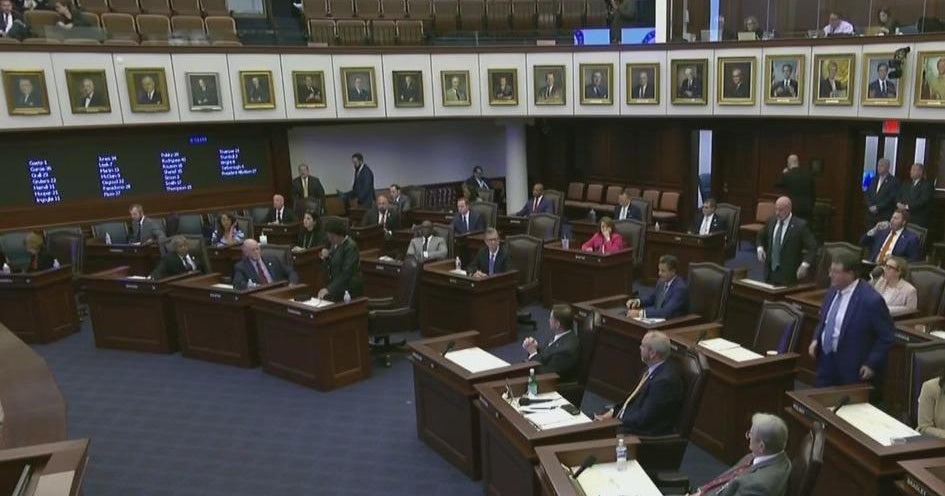Tristin Murphy Act introduced, designed to fix problems exposed in CBS Miami documentary
The Florida Legislature is considering wide-ranging changes to how the criminal justice system deals with the mentally ill, improving diversion programs that will stress treatment over imprisonment.
The legislation, Senate Bill 168, also known as the Tristin Murphy Act, was named after the 37-year-old father of two who killed himself in prison with a chainsaw.
Murphy, who was incarcerated on a littering charge, had a well-documented history of schizophrenia and had been deemed incompetent to stand trial on several occasions. Murphy’s case was chronicled in the 2023 CBS Miami documentary, “Warehoused: The Life and Death of Tristin Murphy.”
Senate President Ben Albritton credited the documentary and his subsequent meetings with Tristin’s parents, Cindee and Dennis, for making this legislation one of his highest priorities.
“Tristin was a young father with supportive, loving parents and a bright future ahead of him. He was not a hardened criminal. He was sick and needed help to address serious mental health challenges,” Albritton said.
“Tristin’s parents have been so brave to tell his story and advocate for improvements to the way offenders with a mental health challenge are treated within the criminal justice system. Learning about Tristin’s story and spending time with his parents, Cindee and Dennis, had a tremendous impact on me. We are proud to move this bill forward with their support.”
The bill is sponsored by State Senator Jennifer Bradley, who held a special hearing during last year’s legislative session to explore what happened to Tristin and the larger problem of mentally ill individuals being held – warehoused – in local jails without treatment. In Tristin’s case, he was held in an isolation cell in the Charlotte County Jail for more than 570 days because the state did not have the facilities to treat his schizophrenia.
“We know certain defendants who have a mental illness, intellectual disability or autism would be better served through community services rather than jail time,” Bradley said in a statement. “There is more we can do to support law enforcement agencies who offer crisis intervention training and diversion for offenders with a mental health challenge. If someone commits a serious, violent crime, they need to be incarcerated for public safety. This bill provides a different path for less serious crimes where the defendant, their family, and the community would be better served by allowing the defendant to receive the necessary mental health treatment.”
Cindee Murphy told CBS Miami she was glad legislators were working to try and prevent what happened to her son doesn’t happen again.
The bill addresses several problems exposed in the CBS documentary.
In Tristin’s case, he would be restored to competency and released on probation. But while the terms of his probation prevented him from drinking, it did not require him to continue counseling or staying on his medications. The bill requires a defendant who was found incompetent and later regains competency to have a mental health evaluation and follow recommendations if they are sentenced to probation.
In Tristin’s case, when he arrived at the state prison in Miami, he never received the proper evaluation, treatment, or medication for his schizophrenia from the prison’s medical staff. Instead, he was cleared for a working detail on the ground’s crew, where he was given the chainsaw he used to take his own life.
The bill requires the Department of Corrections to evaluate the physical and mental health of each inmate eligible for work assignments or a correctional work program.
One of the biggest failings in Tristin’s case was the failure to divert him out of the criminal justice system and instead send him to a mental health court, where he could have received treatment. The bill would expand several pilot programs—including the one in Miami Dade County—to other parts of the state. The bill also gives prosecutors greater leeway in diverting mentally ill individuals.
In an interview with CBS Miami, Senator Bradley said she believes this bill will have the support of her colleagues.
“I’m hoping it brings some comfort to families who have loved ones with mental illness, who worry every day that their loved one is going to have an interaction with the criminal justice system that brings them into the deep end of the system,” she said. “What this bill does is it provides some off ramps. It provides treatment. It provides better training and funding in communities through the state. And the hope is that we provide some options and alternatives in the system to avoid the tragedy that Tristin Murphy experienced from happening to other families.”


/cdn.vox-cdn.com/uploads/chorus_asset/file/25096138/merlin_117454150.jpg)

